Content Warning: This article contains a brief description of sexual harassment.
The 1936 Berlin Olympics is a flashpoint in 20th century history. The world descended on Adolph Hitler’s Germany and were unable to deny the anti-Semitic policies and state-sponsored violence occurring. One Missouri teenager, who never lost a race, was at the center of it all.
Stumbling on an Athletic Prodigy
A few years earlier in Fulton, Mo, Helen Stephens was playing on her church’s basketball team. It was the only athletic opportunity available to girls in her town and Stephens was already determined that her future lay in sports.
She caught Coach Moore's eye as she ran up and down the court. Moore coached the high school’s track and field team and wanted to test Stephens’s speed in the 50-yard dash. To his astonishment, she completed the dash in 5.8 seconds.
Helen's meteoric rise continued when she competed at the National Amateur Athletic Union at the St. Louis Arena. At just 17 years old, she stood among seasoned Olympians like Stella Walsh, known as the "Polish Flyer." The two faced off in the 50-yard dash. In an astonishing triumph, Stephens crossed the finish line in just 6.6 seconds, defeating the crowd favorite and setting the stage for an incredible underdog story.
"I think I won," she said exaggerating her Midwestern drawl with a smile. "You just beat Stella Walsh," the reporter confirmed. With that, the Fulton Flash skyrocketed into the headlines.
Missouri Farm Girl Goes to the Olympics
The pinnacle of her career would take place during the 1936 Olympic games in Berlin. President Roosevelt had reservations about the athletes competing given Hitler’s policies. There was discourse, much of which she was not privy to, around whether the United States should take a stand and refuse to send their athletes. You can hear Stephens’s full account in an interview with the St. Louis Holocaust Museum.
She was set to face off against the Polish Flyer once more. Since their face-off in St. Louis, Walsh had been a no-show for their rematches. Stephens was eager to beat her rival again on a global stage. She beat Walsh again but had no idea that another historical encounter was about to take place.
On her way to a post-win interview with CBS, she and her coach were stopped by a German messenger. He invited the pair to meet Hitler. When her coach said it would have to wait until after their previously planned interview with CBS, the messenger replied “I can’t go back and tell the Fuhrer that you won’t come. He’ll shoot me.”
After the interview, Stephens and her coach made their way to the private meeting. Hitler was complimentary of the athlete, telling her she would make a better competitor for Germany given her Aryan appearance. Though his words were shocking, it was his physical actions that made Stephens freeze.
“He immediately came up and began to pinch me and squeeze me and pinch my fanny and all that stuff,” Stephens said.
Stephens considered herself a student of history and was not blind to what was happening in Germany at the time. When one especially jolly mayor asked if she had any sights she’d like to see in his town, she asked to see a concentration camp.
“If I had hit him in the head with a club you could not imagine the expression on his face,” Stephens remembered. The mayor replied that there were no concentration camps, that the accusation was just propaganda.
“Is This a Man or a Woman?”
Upon returning home to Missouri, Stephens was confronted with a somewhat common accusation against female athletes of that day. In fact, one news reporter described how when Stephens won, the other competitors “proved they were genuine women” by bursting into tears. Implying that their gender was under question given their athletic prowess.
It was even commonplace for female athletes to undergo physical examinations to prove their gender before competing in the Olympics.
One article in Look Magazine included a picture of Stephens running, with the headline “Is this a man or a woman?”
By the time Stephens returned to Missouri from Berlin, she’d been having romantic encounters with women for years. Because she was confident with this part of her identity, she did not anticipate how being a lesbian would impact her athletic career.
She was in her second year at William Woods University, on a full athletic scholarship. The university’s president called her into his office citing the Look Magazine article and Stephens’s rumored romantic encounters as evidence of the embarrassment she was bringing to her school. She was stripped of her scholarship and was kicked out of her student housing.
“We Cannot Leave Out Mabel”
Stephens’s official biographer struggled with how to write about the athlete’s sexuality. Sharon Kinney Hanson is the author of The Life of Helen Stephens: The Fulton Flash and became close with the athlete before her death in 1994. Hanson did not want to be the one to out Stephens, but she knew that her sexuality was central to the story.
After the Olympics, Stephens moved to St. Louis and met Mabel Robbe. The two lived together and were partners until Robbe died in 1986. In her obituary, their 40-year relationship is summed up as: “Longtime friend of Helen Stephens.”
Though Stephen’s sexuality was not at the center of Hanson’s book, she knew Mabel could not be excluded from the narrative. “We cannot leave out Mabel,” she said.
Hanson said she wants people to remember that Stephens “stayed in the game her entire life.” She competed in the Show Me State Games and the Senior Games and helped mentor aspiring Olympians.
This story, titled “‘The Fulton Flash’ Helen Stephens, World's Fastest Woman in 1936,” originally appeared on an episode of Living St. Louis in 2021, produced by Brooke Butler.
Check out our other LGBTQ+ History Month blogs here.









